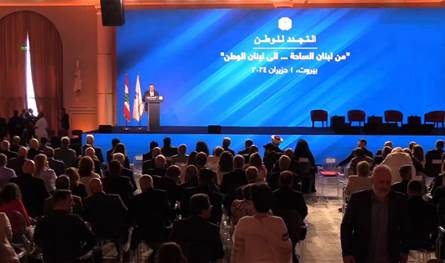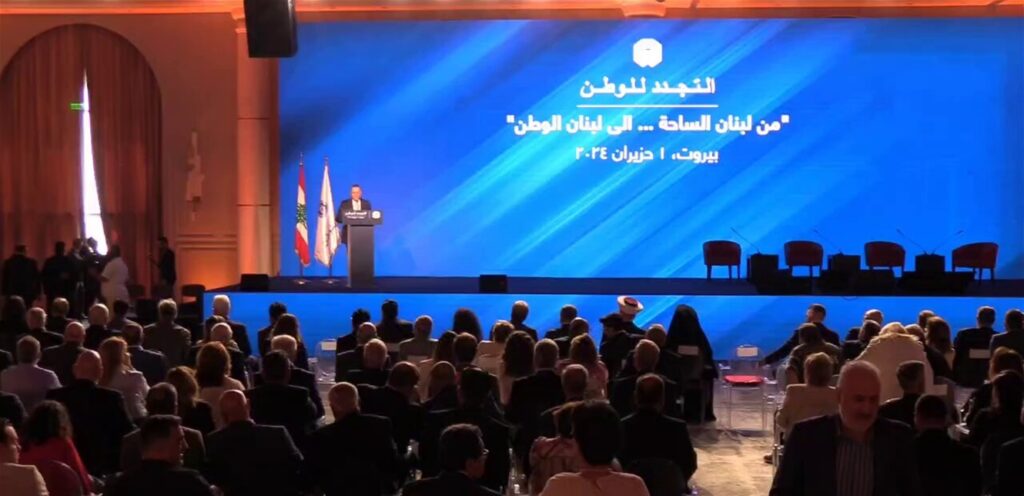
The intervention included a call to deal with the concerns of the sects as they are, even if they are based on illusions, because these concerns have a realistic impact. Fayyad considered that the main concern of the Sunni sect is to protect the Taif Agreement, which gave a distinguished position to the Prime Minister in the constitutional structure. As for the main Druze concern, it is to protect the role in light of the transformations and disturbances that are looming over Lebanon and the region. As for the greater Christian concern, it is represented by protecting the existence and restoring the role and powers in light of the problem of demographic decline, while the Shiite concern is to protect the existence in the face of Israeli aggression. He considered that the Sunni and Druze concerns are natural political concerns, while the Christian and Shiite concerns are existential concerns that require treatment tools from outside the natural logic of the state.
Fayyad believes that the Lebanese formula is so fragile that it produces, in the blink of an eye, a crisis of governance and institutions, and so strong that none of the components are able to bring about changes in it. According to his reading of the Constitution and what is stipulated in the entry of Article 95, that what is short of the stage of radical reforms is a transitional stage, and unless these reforms are implemented, it is also permissible to say that the state is also a transitional state. On the other hand, Fayyad believes that the regional environment is going through a transitional phase to the birth of a regional system under strictness in light of the geostrategic rise of the “axis of resistance,” which in return suffers from geoeconomic weakness, while the societal map at the regional level, “geo-societal,” suffers from serious divisions. .
According to Representative Fayyad, the major features of this regional system are: Israel is more weak, the United States is less able to control the region’s files, and the axis of resistance is more effective.
Fayyad stresses the success of the experience of integration between the resistance and the state away from the relationship of containment, and stresses the necessity of maintaining the distance between the state and the resistance. He concluded in his intervention by moving from floating treatments to deep treatments, stressing the crucial importance of three conclusions: the value of the state and the values of state thinking. The resistance to confront the major challenges facing Lebanon. Adopting a methodology of exchanging concerns and guarantees between the Lebanese components.
Based on this, Lebanon 24 will host academic opinion-makers who express different political orientations to discuss the new dialogue ideas included in Fayyad’s intervention.
The first episode with Professor of Political Science at the Lebanese University and leader in the Progressive Socialist Party, Dr. Walid Safi.
It is important, according to Dr. Safi, to meet each other halfway, in order to launch a serious and responsible dialogue on the thorny issues on which we disagree. Lebanon, with its pluralistic political and sectarian structure, is governed by dialogue and settlements. The Lebanese experience since independence until today has confirmed that internal fighting and confronting controversial issues with counter-approaches have had great costs at all levels and have not led to a solution to our intractable problems. Therefore, dialogue and settlement remain much less costly and would open the horizon to sustainable solutions and enhance confidence between sects.
Each sect has its own different concerns, and this is not new in Lebanon. The crisis that the country is going through at the national level and the blockage in the horizon for a political settlement, starting with the election of the president and ending with the discussion of all controversial issues, are responsible, according to Safi, for the return of concerns to the forefront of the political scene.
The leader of the Socialist Party, Hezbollah’s deputy, does not agree that there are sects facing existential challenges that cannot be solved through state logic. Basically, Lebanon is an entity facing existential challenges, not some sects, and the state is the authority that can be entrusted with dispelling concerns and providing guarantees to everyone. Through their rational and realistic positions, sects can reassure each other. As for guarantees, they are the responsibility of the state. Respecting the state’s constitution and laws and preserving the democratic game, freedoms and political diversity are all the most important guarantees for all sects.
Dr. Safi believes that the Taif Agreement did not enshrine the concerns of the sects, and there is nothing in political science that justifies saying that we are in a transitional state. He draws attention to the importance of separating the state from the political system. The elements of the state are the geographical territory, the population, and the government or political authority. The Lebanese state has met all the conditions, and we can talk about the transitional phase in the political system that awaits the completion of the reforms specified by the Taif Agreement, which address political, economic, and judicial reform, most notably the establishment of a Senate, the preparation of an electoral law on a national basis, the formation of a national body to abolish political sectarianism, and the adoption of extensive administrative decentralization. In Dr. Safi’s opinion, Taif remains the social contract regulating our political and constitutional life, and it is wise today to adhere to it and not to jump over it, or interpret it in a way that is consistent with narrow interests, and to preserve its covenantal spirit and not subject it to the game of the balance of power.
In this context, it is said in some political salons that the Druze are today fighting a battle for survival, and that their interest lies in standing by Arabism. From this standpoint, the leader of the Socialist Party says that the Druze today, under the leadership of former President of the Progressive Socialist Party, Walid Jumblatt, are waging the battle for Lebanon’s existence and preserving its message and democratic system, and they do not feel at all that their existence is threatened. The Druze feel the challenges facing Lebanon, the Arab world, and the Palestinian issue, so today more than ever they are committed to their political choices that are consistent with their Arab and Islamic history. In the past, Father Joachim Mubarak called them “the warrior aristocracy,” given their pioneering role in confronting all the subjugation projects to which the region was exposed. Today, they can be described as “political aristocracy,” which is characterized by wisdom in reading events and proposing approaches to preserve Lebanon within the framework of diversity within unity, and not being led by illusions and projects that are not consistent with our history and Arab affiliation. The Druze position on the Palestinian issue and support of the Palestinians’ right to resist to recognize their rights and establish their state with East Jerusalem as its capital is a historical and principled position enshrined by the martyr Kamal Jumblatt and maintained by former MP Jumblatt despite all the challenges and dangers. As a reminder, the Taif Agreement, which established the finality of the Lebanese entity, also affirmed without any ambiguity Lebanon’s affiliation and Arab identity. Therefore, the Druze are reconciled with themselves in their firm belief that their Lebanese affiliation does not contradict their Arab affiliation, as they view Arabism as a civilizational bond and not a closed nationalism. They are also, according to the martyr Kamal Jumblatt, “the depository of Islam” in this East, which is rich in culture, traditions and values. As a result, the Druze are on the side of Arabism and are keen for the Arab world to regain its regional and international status. This position is not related to immediate and circumstantial interests, but rather is linked to their history and identity, which have been exposed to great challenges, but they knew how to defend and preserve them.
Safi believes that the Lebanese formula is not a fragile formula, believing that political practices that are not consistent with the spirit of this formula and that violate the provisions of the constitution are what stand behind the fragility of the current political scene and disrupt decision-making mechanisms in constitutional institutions. The Lebanese formula is based in its spirit on consensus, and it needs consensual politicians who know the meaning and importance of dialogue and consensus.
Therefore, the political formula alone is not what prevents any party from controlling power completely, says Safi, as Lebanese citizens have a fundamental role in this matter. The Lebanese throughout their history have resisted all forms of subjugation, occupations and guardianships. A single idea or a single-party system cannot exist in Lebanon because they are against the nature of Lebanon’s message. Lebanon is based on freedoms, individual initiative, and religious and political pluralism. It is “the meeting place of Islam and Christianity,” as described by the martyr Kamal Jumblatt, and therefore it is the graveyard of a single idea and totalitarian tendencies.
The leader of the Socialist Party believes that today we need to review the method of managing the formula more than the need to consider the required amendments. He also believes in the importance of implementing Taif in all the reform axes that he touched upon. This is the best way to reveal the need for the necessary amendments and make the system more effective. We need to change Existing practices and a return to the provisions of the Constitution to establish the rule of law. He asks what are the benefits of any amendments to the formula, if political practice remains as it is, undermining the authority of the law and spreading the culture of impunity. It is time to look at the effectiveness of the system that serves all Lebanese, instead of seeking some amendments aimed at improving the position of this or that party in the political formula.
Safi believes that the central state exists in Lebanon, and it exercises its sovereign functions in diplomatic relations, the judiciary, currency minting, and national security. But the problem lies at the level of defense policy, as the state is currently unable to exercise its role in deciding peace and war. Hezbollah clings to its weapons and considers them a guarantee of the existential challenges facing the Shiite community, according to the recent words of Representative Fayyad. There is progress in the party’s proposal through the proposal for dialogue on the function of this weapon. In fact, Hezbollah’s weapons are a regional issue and the final say on it belongs to the Islamic Republic. In principle, the state may not cede any of its sovereign functions to any party, especially national security and defense. This matter gains great importance in a country like Lebanon, as weapons in the hands of any sect, regardless of its function, give it a preponderance in the internal balance of power. But we must not underestimate the importance of the role played by this weapon and the sacrifices made in liberating the south and confronting the Israeli attacks, the latest of which is the ongoing aggression since Operation Al-Aqsa Flood. Therefore, we need a realistic approach to the issue of this weapon and to think about a defense policy that restores the state’s decision of peace and war, and allows the army to define a defense strategy capable of benefiting from the experiences of the resistance, to confront the existing Israeli challenges and dangers, which are many with the government of Benjamin Netanyahu and the extreme right.
Until the conditions for a regional settlement mature that will help resolve this issue, Lebanon, according to Safi, needs at this stage to activate diplomatic work to implement Resolution 1701, and to prevent the Netanyahu government from igniting a large-scale war whose repercussions Lebanon cannot bear.

